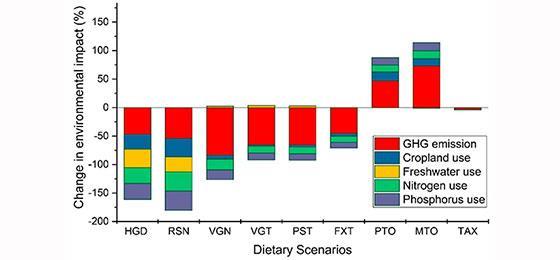Dietary Change Scenarios and Implications for Food Sustainability
29.04.2019
Following the guidelines of Swiss Society for Nutrition is projected to result in 36% lesser environmental footprint, 33% lesser expenditure and 2.67% lower adverse health outcome compared with the current diet.
Transition towards a meat or protein oriented diet can lead to large increases in adverse health outcomes, environmental footprint and daily food expenditure.
Vegetarian and vegan diets might lead to a reduction in intakes of certain micronutrients currently supplied primarily by animal-sourced foods (Vitamin B12, Choline and Calcium).
Achieving a sustainable diet would entail a high reduction in the intake of meat and vegetable oils and a moderate reduction in cereals, roots and fish products and at the same time increased intake of legumes, nuts, seeds, fruits and vegetables.
The current study provides a template to conduct such studies in other countries and settings. Future efforts should focus on assessing the potential of different interventions and policies that can help transition the population from current to sustainable dietary patterns.
The article was published in Nutrients on 16 April 2019.
Legende:
The environmental footprint of nine alternative diets relative to the current diet. Healthy global diets (HGD), Recommendation of the Swiss Society for Nutrition (RSN), vegan (VGN), lacto-ovo vegetarian (VGT), lacto-ovo pescatarian (PST), flexitarian (FXT), protein-oriented (PTO) and meat-oriented (MTO), Food greenhouse gas tax (TAX)
